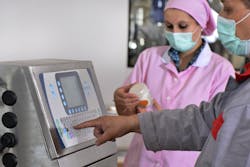In an effort to reduce drug shortages while increasing drug quality, the Food and Drug Administration (FDA) last month released a draft guidance on the use of cutting-edge technology in manufacturing, and is inviting pharmaceutical companies to participate in an implementation program.
The document entitled the “Advancement of Emerging Technology Applications to Modernize the Pharmaceutical Manufacturing Base,” is intended to overcome the current obstacles associated with the deployment of new technologies throughout the manufacturing process.
Specifically, the FDA outlined a plan for modernizing drug manufacturing back in 2002 when it launched the “Pharmaceutical cGMPs for the 21st Century: A Risk-Based Approach.” The initiative encouraged early adoption of modern quality assessment systems. In 2004, a follow on to that called “PAT—A Framework for Innovative Development, Manufacturing, and Quality Assurance,” recommended that quality not be tested after production, but built-in by design.
Many pharmaceutical companies have wanted to implement modern technologies to improve manufacturing processes and drug quality, but adoption has been slow because introducing new techniques could cause delays in drug approvals. That’s because, the very nature of an “innovative approach” means there is a limited knowledge and experiential base that results in FDA reviewers familiarizing themselves with the new technology and how it fits it in with regulatory approaches.
This latest guidance enables pharmaceutical companies to work collaboratively with the FDA’s new Emerging Technology Team (ETT), part of the Center for Drug Evaluation and Research (CDER). Through the ETT, FDA intends to encourage the adoption of innovative approaches to pharmaceutical manufacturing by leveraging existing resources which will facilitate the regulatory review of technology submissions designed to improve product safety, identity and quality.
According to the FDA document, the agency will work with each participant on an individual basis. Based on experience gained during the program, the FDA will develop guidance, standards and approaches to facilitate modernization in pharmaceutical manufacturing.
To be accepted into this optional program, the company must submit its proposed plans regarding an Investigational New Drug (IND) or an original or supplemental Abbreviated New Drug Application (ANDA), Biologics License Applications (BLA) or New Drug Application (NDA) in a written request three months prior to the planned submission. The planned submission will need to include any aspects that the FDA would have limited experience with, and where the technology could modernize the pharmaceutical manufacturing body of knowledge.
The goal is to encourage more pharmaceutical companies to upgrade manufacturing technology. To that end, the FDA said it is not putting a cap on the number of participating manufacturers in an effort to include a wide variety of novel technologies in the program.
About the Author
Stephanie Neil
Editor-in-Chief, OEM Magazine

Leaders relevant to this article:
